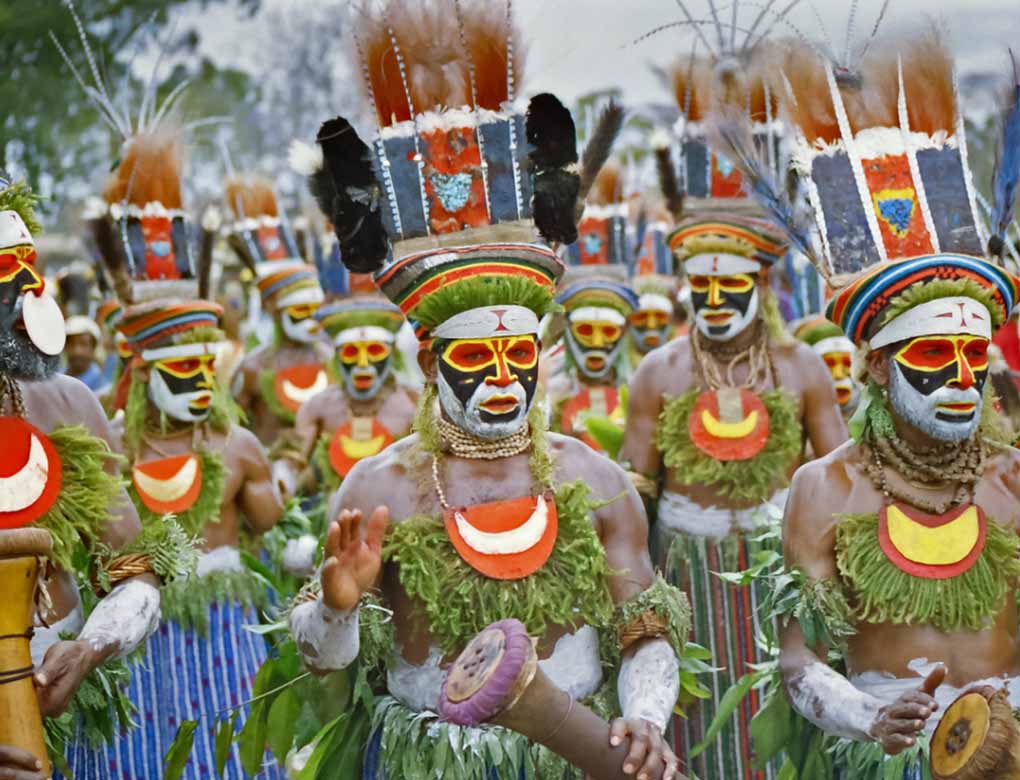Papua New Guinea, also known as PNG, holds a special place in my heart among all the countries I’ve visited so far. The reasons for such attachment are probably my love for birds of paradise and my desire to learn more about the diverse tribal culture in Papua New Guinea’s jungles. Even after five successful expeditions to PNG, I still vividly recall my discussions with my travel agent in 2014 while planning my first trip there. An amiable soul, my former classmate and present-day travel agent tried all tactics in the book to discourage me from embarking on such an adventure. He asked me to Google updates on security risks and mailed me a few travel reviews of dreadful incidents travellers have encountered. But the call of the wild and the motivation instilled in me by the BBC’s Birds of Paradise documentary were powerful enough to ignore any safety warning; the fear gave way to desire.
Distinguishing New Guinea from Papua New Guinea
As for the distinction between New Guinea and Papua New Guinea, New Guinea is the world’s second-largest island. Many people are perplexed by the name “New Guinea” and use it mistakenly to indicate Papua New Guinea. This independent country occupies nearly the entire eastern portion of the island.
The Island of New Guinea is located to the north of Australia. Geologists believe that until 8000 years ago, New Guinea and Australia were connected by land.
Though the island of New Guinea is a single geographical entity, two independent nations politically control it. The island’s eastern half is Papua New Guinea, an independent country with its capital as Port Morseby, while the western half is a province of Indonesia.
In this blog, I discuss Papua New Guinea, which has 850 languages and 650 distinct tribes. It is a place where tribal war can erupt for no apparent reason. Cannibalism, though, is now legally banned but was practised by some tribes until recently. Nonetheless, as a traveller, you will be drawn to this country when considering the exotic experiences and the peculiar natural world the country can provide. I am not advocating to undertake any trip, simply ignoring the underlying risks. The projected risk can be mitigated if you plan your trip with professional tour companies and tour guides in Papua New Guinea. Following my numerous trips, I can now confidently state that many dreadful stories about local people are baseless and false and that the vast majority of the people of Papua New Guinea are kind and friendly.
Ideal Time to visit Papua New Guinea?
If you are visiting PNG to see birds or culture, June to October months are the ideal time to plan your itinerary. These months are relatively dry seasons in PNG. Since the birdlife in PNG is mostly endemic, birdwatching can be undertaken any time of the year. However, it is recommended to go birding in the dry season, considering lesser rainfall and bearable humidity in the low lands that the season offers. Since it is prime tourist season in PNG, travelling between June-October can be more expensive.
If you are a cultural travel enthusiast, there is no better time than the sing-sing festival season to visit PNG. The sing-sing is a gathering of different tribes to show their different cultures through dance and music performances. The goal of these gatherings is to share traditions without fighting. The Mount Hagen Show in August and the Goroka Show in September are some of the most famous sing-sing events.
7 Tips for Traveling to Papua New Guinea
1. Never get involved in tribal feuds.
The outbreak of tribal violence can occur anywhere, at any time, and quickly escalate. Avoid large crowds and public gatherings because they can turn violent, even for trivial reasons. Never get involved in local fights or disputes, even if you have local friends or security guards with you. Minor disagreements could quickly escalate into bloody fights.
2. Avoid driving at night.
Many cities and suburbs are dangerous places to walk at night, even in small groups. Avoid going out if you don’t have any trustworthy local friends, guides, or security personnel with you. Sexual and physical assaults are common in some areas, in addition to petty thefts.
3. Plan your trip with reputable local tour operators or tour guides.
The best way to avoid unpleasant incidents while travelling in Papua New Guinea is to hire a reputable local travel company or guide. You must also be willing to accept and adhere to their rules and suggestions.
4. Avoid visiting PNG during the rainy season, which lasts from November to May.
Natural disasters such as earthquakes, flash floods, and landslides are common on the island of New Guinea, particularly in Papua New Guinea.
The majority of such disasters occur during the rainy season. So it is preferable not to travel to PNG during the rainy season.
5. Take precautions against malaria and other possible health risks.
Malaria and many waterborne diseases are common throughout the lowlands, including Port Morseby. Taking prescription malaria tablets can provide up to 80% protection, but it is not a 100% guarantee against the disease. It would be best to avoid being bitten by mosquitoes at all costs. Long sleeves and mosquito-repellent creams can provide additional protection. For extra safety and health information, please see the following link.
6. Stay in secure and clean accommodations.
If you search the internet, you will find many horrifying stories about expensive items being stolen from locked hotel rooms, food poisoning, pathetic hygiene and cleanliness conditions, severe allergic reactions caused by bed bug bites, being duped by some hotel operators, and so on. When selecting hotels or lodes in PNG, you must exercise utmost caution. It would be best if you also remembered that good and genuine accommodations are expensive in PNG.
Here is a list of hotels that I stay at and recommend to my friends whenever I visit Port Moserby
7. Take it easy!
You must always practice this critical quality while travelling in Papua New Guinea. Things in PNG will not run as smoothly and planned as many of us have been accustomed to. Last-minute changes of plans due to weather, flight cancellations, and other factors are common and expected in any adventure to PNG
I wish you a great trip to Papua New Guinea!


